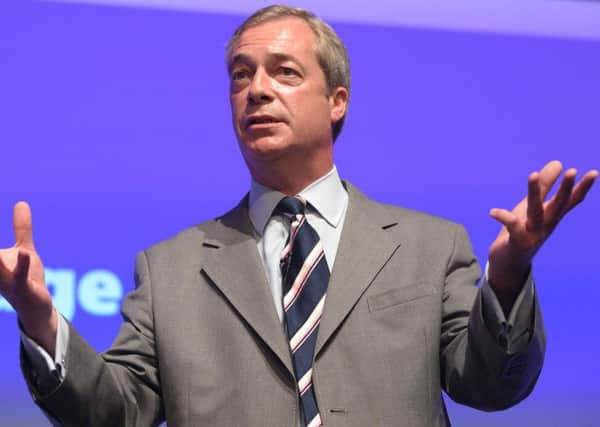YP Comment: Ukip lurches toward farce - Power struggle threatens party


Having fought so hard and for so long to be taken seriously, the party is now descending into pure farce.
First it moved to block prominent figures such as Suzanne Evans, a Farage critic, from standing for the leadership by ruling that only those who had been a member for at least five years could run.
Advertisement
Hide AdAdvertisement
Hide AdThen favoured successor Steven Woolfe was also barred by the party’s National Executive Committee after submitting his nomination forms 17 minutes late.
Diane James was duly elected, only to stand down 18 days later because she didn’t command the full support of Ukip’s MEPs.
Now Mr Woolfe has been hospitalised following an altercation with Yorkshire MEP Mike Hookem. You simply couldn’t make it up.
It is clear that Nigel Farage’s decision to stand down as leader has created a power vacuum with separate factions wrestling for control.
Advertisement
Hide AdAdvertisement
Hide AdMembers have voiced their belief that a coup is under way led by Evans and fellow ex-Conservatives Neil Hamilton and Douglas Carswell.
It was always going to be difficult to replace Mr Farage, who often seemed to hold the party together by dint of sheer personality alone.
However, having made such inroads into mainstream British politics and garnered such a wealth of populist support, it would be catastrophic for Ukip if it were to allow this damaging instability to continue or, even worse, split into two, inevitably weaker, parties.
It is important for Britain too that as Theresa May seeks to plot a course out of the European Union, a strong Ukip is on hand to pay close scrutiny to that process and ensure our departure is on the right terms.
Theresa May’s dilemma
Advertisement
Hide AdAdvertisement
Hide AdSPEAKING of Brexit, business leaders across the region may have been divided over whether leaving the EU was the right thing to do but there is far greater unity in the call for Theresa May and David Davis to make securing a favourable trade deal with its remaining members a priority.
That was certainly the sense among those representatives of Yorkshire firms who gathered for a business event in Doncaster yesterday.
Of course, a good trade deal will mean different things for different companies. The size and type of business will dictate to a large degree the sort of safeguards that firms will want put in place to ensure they are still able to flourish.
There will already be concerns, however, that reducing immigration appears to be a greater political priority than the key aim of preserving access to the EU’s single market.
Advertisement
Hide AdAdvertisement
Hide AdStrong hints to this effect – such as the proposal to force companies to name foreign workers – this week sent sterling to a 31-year-low against the dollar.
There was a strong feeling among business leaders who backed Brexit that Brussels red tape was stifling every one of Britain’s businesses, even though the majority do not actually trade with the EU.
For those whose livelihoods depend on selling to its members, however, there is a palpable need for the Government to formulate a ‘Plan B’, given that the EU’s member states remain adamant that access to the single market is inseparably bound up with the acceptance of the principle of freedom of movement for people.
It is this incompatibility between her Government’s two key objectives that Mrs May must resolve before Article 50 is triggered. The future success of Yorkshire businesses depends on it.
Radio’s Woman’s Hour turns 70
Advertisement
Hide AdAdvertisement
Hide AdLAUNCHED 70 years ago, Radio 4’s Woman’s Hour is rightly regarded as a champion of women’s issues, Barnsley-born presenter Dame Jenni Murray enjoying a devoted following among her listeners.
However, it was not always that way. When the programme first hit the airwaves in 1946 it came with an inbuilt superiority complex and a male presenter.
A doctor’s talk on “How to Be a Happy Woman”, encouraging the letting go of “frustration”, particularly incensed housewives who had returned to the grind of looking after family and home after war years spent keeping the wheels of industry turning.
Thankfully, the BBC learnt its lesson and was soon in tune with the evolution of the nation’s womenfolk. It is why Woman’s Hour is now a beloved insitution, with a good many male listeners too.